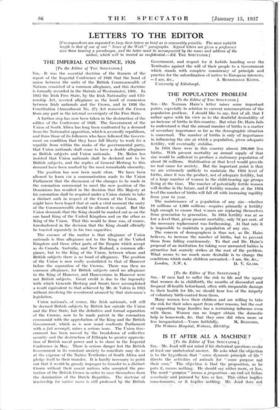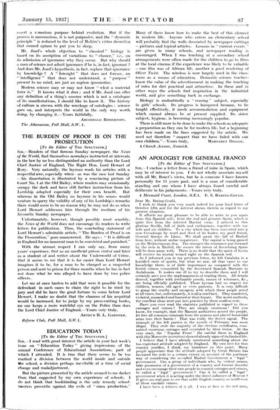IS IT AFTER' ALL A MACHINE ? .
[To the Editor of THE Scneawr0n.1
SIR,—Mr.ioad will not mind if his rhetorical questions evoke at leaA one unrhetoritalinsWer.. He asks what.the objection is to the hyPdthesis that "some dynamic principle of life"! directs the activities of animals for '` some purpose net their own." The objection' is that the proposition, as hp puts it, means nothing. He should say either pore..orless. The word "-prirpoke '" ineans Propogituin—an end 'set somebody' and Inir-s-iied'bk him of her. This-either implies consciousness; or Joact does not
assert a conscious purpose behind evolution. But if the process is unconscious, it is not purposive, and.the " dynamic principle " is reduced to the level of Moliere's virtue dortnitica that caused opium to put you to sleep, Mr. Joad's whole objection to " classical " biology is based on its ascription of variations to " chance," i.e., on its admission of ignorance why they occur. But why should a man of science not admit ignorance if he is, in fact, ignorant ? And does Mr. Joad's hypothesis, in fact, replace that igniwance by knowledge ? A " foresight " that does not foresee, an " intelligence " that does not understand, a " purpose " present to no mind, are just an asylum ignoraniiae.
Modern science may or may not know " what a material force is." It knows what it does ; and if Mr. Joad can offer any definition of a thing'i essence which is not a catalogue of its manifestations, I should like to know it. The history of culture is strewn with the wreckage of ontologies : science goes on, and interprets the world in the only way worth doing, by changing it.—Yours faithfully,











































 Previous page
Previous page